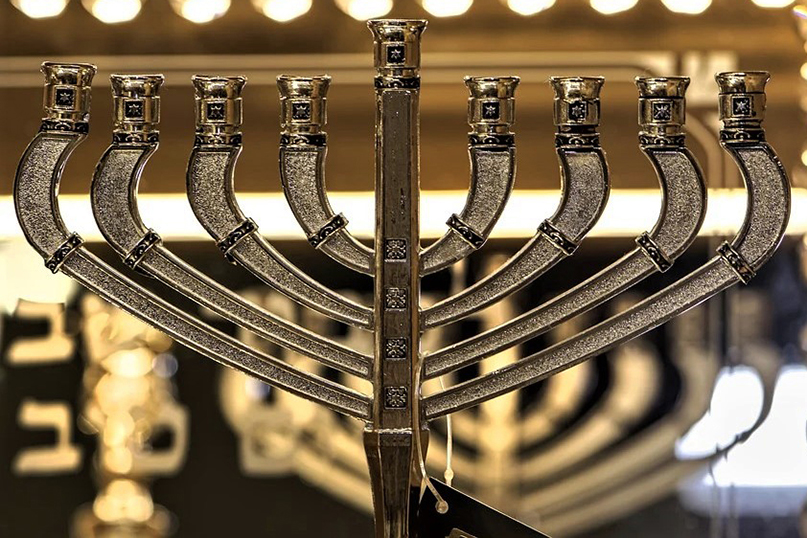
In 2021, the eight-day Festival of Lights starts on the evening of Sunday, Nov. 28, and lasts until the evening of Monday, Dec. 6.
How Judith became a Chanukah heroine
By Sarah Ogince
(JNS) Holding a sword in one hand and a severed head in the other, she is terrifying and beautiful, a personification of the feminine power to entice, destroy and redeem.
This is Judith, a pious Jewish widow who, in the apocryphal book that bears her name, seduces and then beheads an enemy general. An object of fascination for millennia, she inspired paintings by Caravaggio and Michelangelo, oratorios by Vivaldi and Mozart. She also appears on antique menorahs.
In Jewish tradition, Judith—or Yehudit—is the heroine of the Chanukah story. A female counterpart to Judah the Maccabee, she is credited with precipitating the Syrian-Greeks’ downfall with her courageous act. Some Jews eat dairy products on Chanukah to commemorate the salty cheese she offered to the general before she killed him.
But Judith’s path to Chanukah heroine was not a smooth one. In fact, for more than a thousand years after it was written, her story was forgotten.
“It is not clear precisely when or why [Judith] disappeared from Jewish tradition, nor do we know for certain whether it was originally written in Hebrew or in Greek,” Deborah Gera, emerita professor of classics at Hebrew University of Jerusalem and author of a commentary on the book of Judith, told JNS.
The oldest copy of the book of Judith is found in the Septuagint, a Greek translation of the Hebrew Bible compiled around the second century BCE. It reads something like this:
Judith, a beautiful and religious widow living in the Judean town of Bethulia, finds herself at a critical juncture in history—Holofernes, a general of Nebuchadnezzar, “king of Assyria,” has besieged her town on his way to conquer Jerusalem. The townspeople are ready to surrender, but Judith reprimands them for their lack of faith and convinces them to wait a little longer. She dresses in her finest garments, approaches the enemy camp and demands to see the general, claiming to have information to share.

Credit: Wikimedia Commons.
Holofernes is entranced by her beauty and invites her to a banquet in his tent. Apparently, at Judith’s urging, he drinks “so much [wine] as he had never had in his life” (12:20) and passes out. Judith utters a prayer and beheads him with his own sword. She takes Holofernes’ head back to Bethulia and tells the people to hang it from the city walls. The encouraged Jews proceed to rout the disheartened Assyrian army; Judith sings a song of praise to G-d, and lives to be 105 years old, during which time, “there was none that troubled Israel” (16:30).
‘Women are obligated to light the menorah’
Though scholars agree that it was written by a Jew, the book of Judith, like the book of the Maccabees, was not included in the Tanach, the Jewish scriptural canon. This may be because it was composed so late (scholars date it to around 100 BCE) and because the text contains obvious anachronisms: Nebuchadnezzar was a Babylonian king (the Assyrians were his enemies); the story takes place in the “13th year” of Nebuchadnezzar’s reign, or 592 BCE—five years after the first Babylonian siege of Jerusalem; and the town of Bethulia is not mentioned anywhere else in scripture or historical records.
Being excluded from the canon did not cause the Maccabees to be forgotten—their story was preserved in the Talmud—but for Judith, it was fatal. She is not mentioned in the Dead Sea Scrolls or other early sources. “When Judith returned to Jewish sources in medieval times, it was in the wake of the translation of the Vulgate, the Latin version of Judith, into Hebrew,” said Gera. “The Vulgate version of Judith is different from the Greek one, with Judith a less independent figure, and the medieval Jewish Judith comes from this Latin tradition.”
It is in these medieval tales, or “Judith midrashim,” that Judith becomes a Chanukah heroine. In them, Nebuchadnezzar is Antiochus IV Epiphanies, the evil Syrian king of the Chanukah story; Judith is the daughter or aunt of Judah the Maccabee, her victory over Holofernes mirroring Judah’s beheading of the Syrian general Nicanor. And while the first Judith brought her own food into Holofernes’ tent to avoid eating non-kosher food, the Chanukah Judith brings salty cheese, which she feeds to the general, causing him to binge on wine.
The Judith midrashim eventually found expression in Jewish law. The medieval French commentator Rashi alludes to Judith, writing that women are obligated to light the menorah because the miracle of Chanukah was brought about by a woman. In his commentary on Shulchan Aruch, the “Code of Jewish Law,” Rabbi Nissim ben Reuben (c. 1310-1375) calls Judith the daughter of the High Priest Yochanan and cites her story as the source for the custom of eating cheese on Chanukah.
Despite her long absence from Jewish tradition, the historical interpretation of Judith is likely correct. The Maccabean Revolt took place in 164 BCE, six decades before the book of Judith was composed, and it is entirely possible that the author intended the story to be understood in that context. Certainly, Judith makes Chanukah—and its cuisine—richer.
“Judith is a paradoxical, challenging heroine, a pious and seductive woman who prays regularly to God and saves her people by lying and killing,” said Gera. “Some modern readers of her story may have reservations about the means Judith uses to achieve her ends, but it is difficult to resist her cleverness, independence and beauty.”
The Chanukah story that Jews need to learn
By Steven Burg
(JNS) Many of us know the themes of the Chanukah story: pride in being Jewish; the few against the many; the defeat of our enemy; and the rededication of the Jewish Temple. Or perhaps some have only learned of the miracle of the oil and how it burned continuously for eight days. While these are important themes, there is much more to the Chanukah story that is at the heart of why we celebrate the holiday and why it’s so relevant today.
Looking at the story of Chanukah, which happened in the second century BCE, we know that many Jews of that era were assimilated. They wanted it all; they identified as Jews but didn’t want to affiliate, and they were not studying Torah. Some were culturally Jewish—until that, too, was banned.
These Jews, known as Hellenists, emulated everything Greek culture had to offer. In order to be accepted in the halls of commerce and power, they thought that they had to dissociate themselves from their Jewish brothers. Core Jewish values of justice and morality got in the way of the self-preserving and decadent mores of the conquering Greek culture.
But when the non-Jewish ruling government started to clamp down on religious freedom, life became decidedly uncomfortable for their brethren—observant Jews. Forced to do away with Jewish rituals, including brit milah (circumcision), Jewish names, Shabbat, festivals and Torah study, those who hadn’t assimilated were forced to choose between embracing Greek culture or punishment by death.
A minority within the religious community that chose to fight this oppression joined the Maccabees and became part of an uprising. They managed a miraculous military defeat, the part of the Chanukah story that is well known.
The other piece of the story, however, is that the pressure to stamp out “hard-line Judaism” came from the Hellenists—the assimilated Jews. They resented the fact that their lives were made more difficult by a minority of their own people who refused to “give up their old ways.”
The Assyrian Greeks, as conquerors of the land of Israel, expected to absorb the Jews, despite the fact that they were indigenous. Not only was it uncomfortable (and not politically correct) for those who wanted to fit in; but the Hellenists (Jews) were just as brutal towards their fellow Jews who refused to fit into the “new reality and morality.”
Those who held fast to their Jewish heritage were “called out” and turned in to the authorities by other Jews. The Maccabees were forced to go into hiding and deal with castigation from their own, in addition to fighting their Greek oppressors.
As we near the Chanukah season, a time when we celebrate our own Jewish pride, we sadly find ourselves in the shadow of the Hellenists. Fast-forward a few thousand years, and here we are, reading about Jewish employees at Amazon and Google who are leading the charge with a petition to get their respective companies to “call out” their fellow Jews. They are asking for these two corporate giants to renege on a contract with the Israel Defense Forces, which would ultimately compromise the security of the State of Israel—their eventual goal.

Armed with incorrect and erroneous information, the petitioners claim that the use of the government’s cloud storage will cause harm to the Palestinians, and aid and abet Israeli settlement activity in “occupied territory.”
What the petition does not address is that Google and Amazon both have contracts with countries that openly admit to occupying territory. Russia, which occupies part of Georgia and Ukraine; Vietnam, which occupies Cambodia; and others. In other words, these social activists are silent when it comes to human-rights violations around the world.
Both Amazon’s and Google’s signed contracts will help Israel continue to prosper and grow with safety and security, innovating solutions to problems around the world. This is a fact ignored by the United Nations and the majority of the world, with a false narrative of oppression, and misunderstood by the petition’s signatories.
If I am a Jew with no understanding of why that matters or how that makes me part of a family, then I can only distance myself from my own people and culture if I find an opportunity to call them out. This allows me to dissociate with the parts of where I come from that I don’t understand enough to value or know are sources of pride. And, the self-loathing as a Jew that translates into destructive antisemitism on this systemic level is more than frightening.
Make no mistake about who is responsible for this lack of understanding and the need to dissociate from the greater Jewish community: We are.
The global Jewish community has known for some time that Jewish education has failed most of its own children. The experiment of passing along nice stories and abstract ideas without context, practice or community has simply failed.
Of the 5.8 million adult Jews in the United States, 1.5 million—or just above 25 percent—identify as “Jews of no religion.” The 2020 Pew study, released in May 2021, tells us that Jews are no longer affiliating with synagogues or even other, secular Jewish institutions.
They have not had positive Jewish experiences. They don’t know what the Jewish religion is about or why it should be a source of pride. They do not know what Jewish wisdom is or why they should.
They do not identify with other Jewish people as the one Jewish family that we are.
We have watched this problem grow and worsen. AISH founder Rabbi Noah Weinberg warned of the dangerous ramifications as far back as the 1970s. Because we have allowed Jews to grow into young adults without Jewish wisdom or understanding of Jewish values, focusing instead on talent, ambition and intelligence—as a way of making a mark on the world—we see the devastating rise of attacks on other Jews. Tragically, it is inevitable.
While I am sure that many of the young, misguided activists involved believe that they are innovative and trailblazing, they could sit down with the thousands of Jews that the Maccabees had to fight so many hundreds of years ago and hear the power of their hindsight. They might wring their heart upon learning just how wrong—dangerously wrong—they are, but should this scenario actually be able to take place, they would rightfully turn to us and ask: “Why didn’t you teach us to know better?”
And they would be right.
I have every faith that the cloud-storage contract will move forward as planned. And should Google and Amazon not merit working with Israel, another company will. Even if Israel has to build its own storage or contract with a smaller David instead of a Goliath, someone else will make that money and help Israel continue to be a source of good. It may take longer, but it will happen.
Sadly, it may be too late to bring any kind of understanding to many of those who signed this petition or to their peers. It is Judaism’s core values that are the true path to justice, righteousness and human dignity, and the path to actually end oppression in the world.
But it is never too late for those who will come next. And when they turn to us and ask why we didn’t teach them to know better, what will our answer be?
At Aish, we are laser-focused on standing up and taking responsibility for conveying and sharing Jewish wisdom, trying to reach a staggering number over the next decade so that they can “know better.”
This requires out-of-the-box creativity, including massive initiatives on social media. This is where the next generation of leaders, thinkers—and Google employees—digest their information.
Once we manage to break through the constant cacophony of too much digital information, where do we take those who are curious? We at Aish are working on developing content that effectively gives a “customer journey,” allowing people wherever they are, regardless of background, access to timeless Jewish wisdom. Some others are, too, but we know it’s not enough.
As a Jewish community, we have to wake up and deal with the situation as the emergency that it is. We must connect the attacks on Israel, the attacks on Jews, the embarrassment in public and in private, in admitting one is a Jew in America today as the urgent, threatening state that it is. We cannot continue to ignore the lack of Jewish literacy and the growing antisemitism coming at us, even and especially from our own brothers and sisters.
It’s not only that our own are turning on their Jewish family. It’s not only that the Jewish people’s homeland faces daily attacks from our own. All of this is true. But we are also failing those who are choosing to attack us, and we have the power to bring change.
Rabbi Steven Burg is CEO of Aish and on the board of governors of the Jewish Agency.








 Southern New England Jewish Ledger
Southern New England Jewish Ledger








